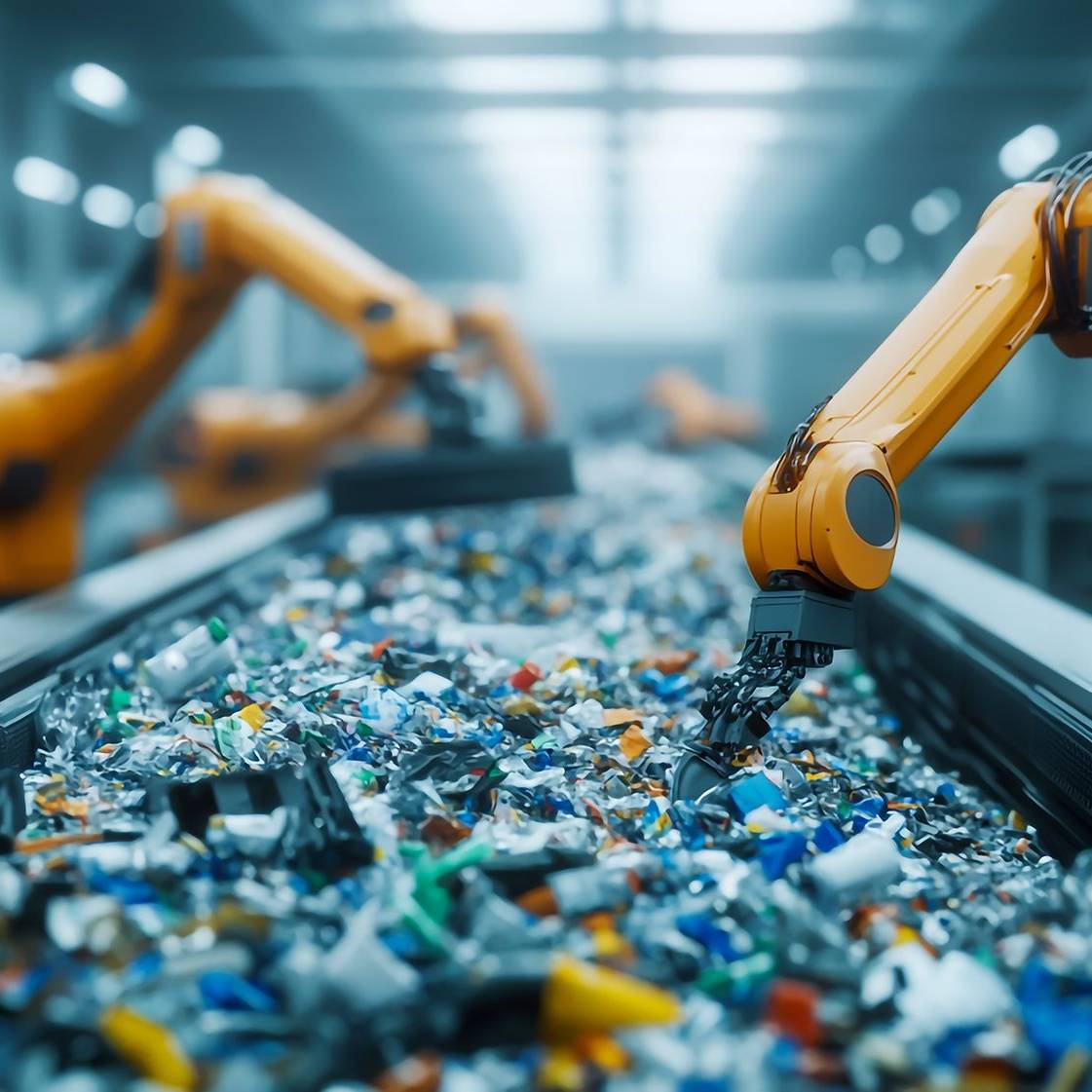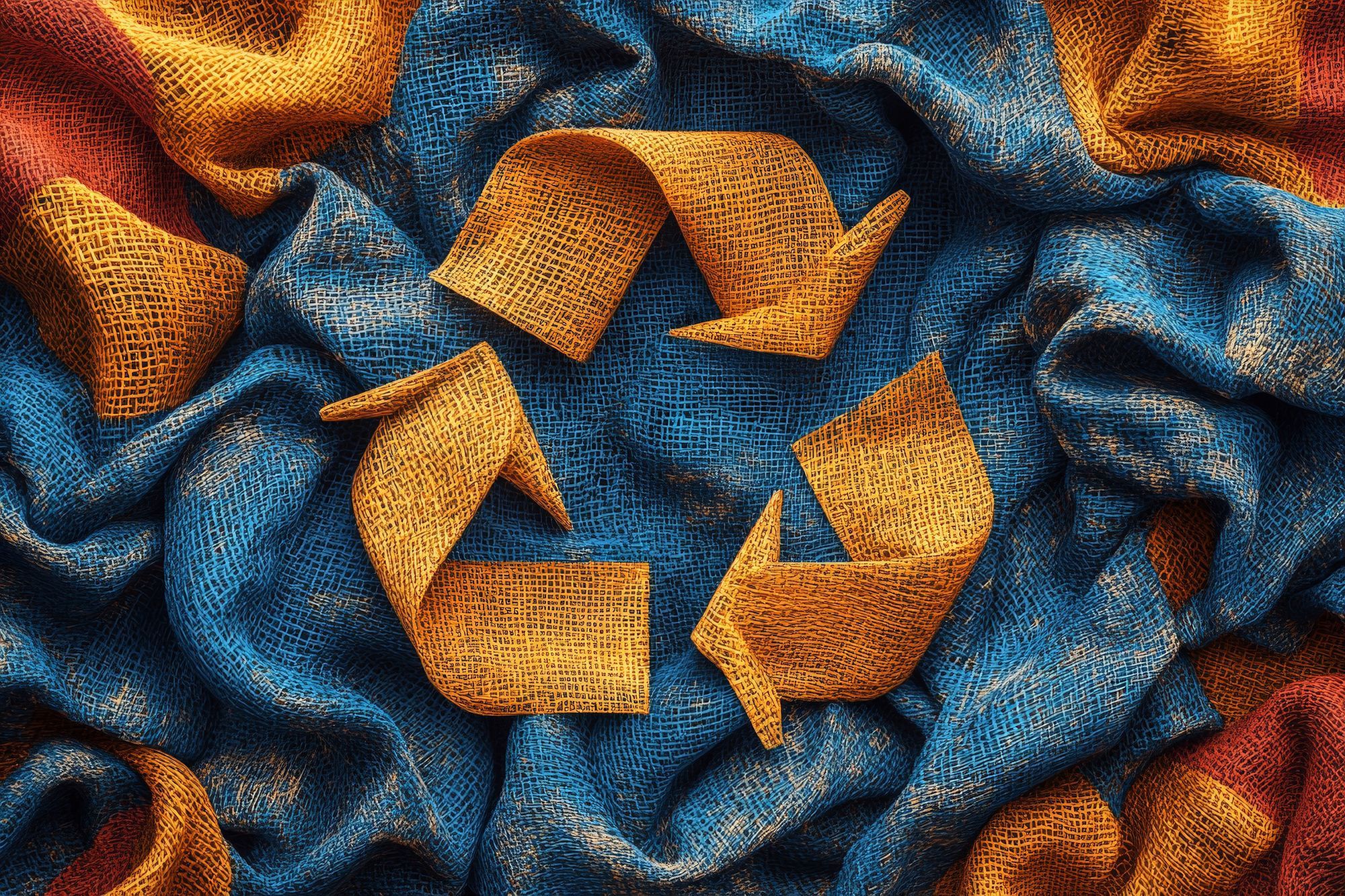TREND FOUR:
AI-OPTIMISED RECYCLING AND SUPPLY CHAINS
The sheer variety of the materials we use today – and the way we use them in combination – is a fundamental problem for today’s recycling systems.
The difficulty of disentangling mixed waste streams is a major barrier to circularity, but the extraordinary pattern recognition capabilities of AI mean there are new opportunities to sort at scale. AI also has powerful matchmaking capabilities that can be used to pair producers of waste with companies who can use it. Innovators are putting both of these capabilities to good use to improve the logistics of circularity.
INNOVATION ONE:
AI scanners speed up textile recycling
In Europe, more than 15 kilogrammes of textile waste is generated per person every year, and only around 60 per cent of this waste is reused or recycled. One reason for this is that recycling textiles requires the identification and separation of the component fibres, with each fibre type needing a specific recycling process..
Unfortunately, the most common disposal methods for textile waste are incineration or landfill, which are both environmentally damaging and waste potentially valuable materials. To make it easier to sort textiles for recycling, UK startup Matoha Instrumentation has developed several devices that use infrared technology to rapidly scan and identify the composition of textiles in less than a second.
Matoha’s devices allow recyclers to sort waste efficiently without a huge investment in infrastructure or the need for expensive and time-consuming lab analysis. The company also manufactures scanners for identifying different plastics.

The scanners come in handheld, bench, and desktop versions, as well as sensor versions that can be used in reverse vending machines or other automated systems.”

The scanners come in handheld, bench, and desktop versions, as well as sensor versions that can be used in reverse vending machines or other automated systems. The devices are designed to be affordable and usable without advanced or specialist training. They can also support a wide range of communication interfaces and work anywhere.
Chris Newton, Matoha’s chief commercial officer, told Springwise that he is inspired by the power of technology to solve real problems and believes in practical solutions that anyone can use. He added that “Most recycling fails because people can’t identify what’s in front of them. If you give people the right tools, they can make better choices for the planet and for their businesses.”
Matoha has completed the first phase of a £1.5 million seed funding round to support the scaling of its technology and develop additional automation of the scanning process. With the textile industry currently responsible for up to eight per cent of global greenhouse emissions, improving the ability to recycle textiles could be key to developing a circular, lower-carbon model of textile production.
TAKEAWAYS:
- Matoha Instrumentation has developed several devices that use infrared technology to rapidly scan and identify the composition of textiles
- Recyclers use the devices to sort waste efficiently without a huge investment in infrastructure or the need for expensive and time-consuming lab analysis.
- The technology is designed to be affordable and usable without advanced or specialist training
INNOVATION TWO:
A procurement co-pilot for circular materials
US startup Replenysh connects various players across the materials value chain to ensure that waste products are revalorised where possible and help manufacturers access a reliable supply of circular resources. As well as making it easier for brands to adopt circular materials – and meet increasingly stringent environmental regulations – strengthening the supply of recycled materials also helps companies bolster their supply chains and protect themselves against fluctuating material availability and price.
Producers of recyclable materials include locations like restaurants, university campuses, and hotels, and Replenysh works with operators to collect and process this waste. Through the Replenysh platform, brands can then easily access the certified, high-quality circular materials they need for manufacturing. The whole process is transparent and traceable, with users able to verify the origins of all new materials sources.

To make sustainable waste management and circular procurement more seamless, Replenysh also works directly with companies and municipalities to implement programmes.”

To make sustainable waste management and circular procurement more seamless, Replenysh also works directly with companies and municipalities to implement programmes, including by developing the technology and infrastructure for effective waste pick-up sites. The startup has already worked with brands like Walmart, Hyatt Centric, PepsiCo, and BlueTriton.
Replenysh recently announced that it has raised $8 million in a series A funding round led by M13. Having already established successful circular programmes in Southern California, the East Coast, and the Midwest, Replenysh is using its latest funding to accelerate expansion across the rest of the US.
INNOVATION DATA:
Country: US
Development stage: Scaling
Funding stage: Venture (A-B)
Contact: support@replenysh.com
TAKEAWAYS:
- Replenysh connects various players across the materials value chain to ensure that waste products are revalorised where possible
- Through the Replenysh platform, brands can easily access certified, high-quality circular materials for manufacturing
- The platform makes it easier for brands to adopt circular materials, helping them to improve sustainability and protect against supply chain fluctuations
INNOVATION THREE:
AI photo analysis boosts waste management
Efficient waste management is critical for cities and organisations that want to maximise recycling efforts and cut their carbon emissions. The issue is that large factory sites often have huge volumes of discarded materials that need to be sorted and analysed before they can be processed, often requiring time, money, and manpower that companies cannot afford. Enter Wastetide.
In order to transform waste management from a time-consuming, manual process, the French startup is enlisting the help of AI. With an easy-to-integrate solution, Wastetide aims to help companies cut the emissions associated with their waste, as well as extract the most financial value out of it.
Rather than requiring expensive hardware installations, Wastetide’s solution can be operated using a smartphone on the factory floor. Using the dedicated Wastetide app, users take photos of their mixed waste, and the AI then identifies the various components of the waste.

Rather than requiring expensive hardware installations, Wastetide’s solution can be operated using a smartphone on the factory floor.”
The AI’s findings are then measured against a recent waste management bill to understand where companies could save and even make money (for instance, by selling more materials on to recyclers, which would also help reduce their environmental impact). Wastetide then gives a concrete breakdown of these potential financial and carbon savings. Waste data collected by Wastetide can also be used to streamline a company’s environmental, social, and governance (ESG) reporting and improve compliance.
The company’s AI helps users manage virtually any industrial waste, including metals, plastics, and cardboard, as well as more complex waste streams like old electronics, medical waste, and construction materials. According to Wastetide, its technology can cut the carbon footprint of each of its user’s waste by 200 kilogrammes, while reducing waste management costs by 30 per cent.
In September 2024, it was announced that Wastetide had joined the latest cohort for the Google for Startups Accelerator in Europe: Climate Change, benefitting from a 10-week programme where startups receive valuable training, tools, and collaboration opportunities.
TAKEAWAYS:
- Wastetide enables companies to understand the emissions and financial value associated with their waste via a smartphone
- Using the Wastetide app, users take photos of their mixed waste, and the AI then identifies its various components
- The AI helps users manage virtually any industrial waste, including metals, plastics, and cardboard, as well as old electronics, medical waste, and construction materials